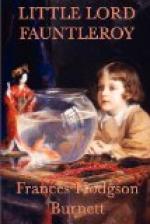“They all think that,” said the Earl, looking rather black.
Fauntleroy made a movement forward. He had been standing between his grandfather and the visitor, listening with all his might. He had begun to be interested in Higgins at once. He wondered how many children there were, and if the scarlet fever had hurt them very much. His eyes were wide open and were fixed upon Mr. Mordaunt with intent interest as that gentleman went on with the conversation.
“Higgins is a well-meaning man,” said the rector, making an effort to strengthen his plea.
“He is a bad enough tenant,” replied his lordship. “And he is always behindhand, Newick tells me.”
“He is in great trouble now,” said the rector.
“He is very fond of his wife and children, and if the farm is taken from him they may literally starve. He can not give them the nourishing things they need. Two of the children were left very low after the fever, and the doctor orders for them wine and luxuries that Higgins can not afford.”
At this Fauntleroy moved a step nearer.
“That was the way with Michael,” he said.
The Earl slightly started.
“I forgot you!” he said. “I forgot we had a philanthropist in the room. Who was Michael?” And the gleam of queer amusement came back into the old man’s deep-set eyes.
“He was Bridget’s husband, who had the fever,” answered Fauntleroy; “and he couldn’t pay the rent or buy wine and things. And you gave me that money to help him.”
The Earl drew his brows together into a curious frown, which somehow was scarcely grim at all. He glanced across at Mr. Mordaunt.
“I don’t know what sort of landed proprietor he will make,” he said. “I told Havisham the boy was to have what he wanted—anything he wanted—and what he wanted, it seems, was money to give to beggars.”
“Oh! but they weren’t beggars,” said Fauntleroy eagerly. “Michael was a splendid bricklayer! They all worked.”
“Oh!” said the Earl, “they were not beggars. They were splendid bricklayers, and bootblacks, and apple-women.”
He bent his gaze on the boy for a few seconds in silence. The fact was that a new thought was coming to him, and though, perhaps, it was not prompted by the noblest emotions, it was not a bad thought. “Come here,” he said, at last.
Fauntleroy went and stood as near to him as possible without encroaching on the gouty foot.
“What would you do in this case?” his lordship asked.
It must be confessed that Mr. Mordaunt experienced for the moment a curious sensation. Being a man of great thoughtfulness, and having spent so many years on the estate of Dorincourt, knowing the tenantry, rich and poor, the people of the village, honest and industrious, dishonest and lazy, he realized very strongly what power for good or evil would be given in the future to this one small boy standing there, his brown eyes wide open, his hands deep in his pockets; and the thought came to him also that a great deal of power might, perhaps, through the caprice of a proud, self-indulgent old man, be given to him now, and that if his young nature were not a simple and generous one, it might be the worst thing that could happen, not only for others, but for himself.




